Online debate community for logical, passionate people - CreateDebate
Infinite Learning Lab
As of July 1, 2013 ThinkQuest has been discontinued. We would like to thank everyone for being a part of the ThinkQuest global community: Students - For your limitless creativity and innovation, which inspires us all. Teachers - For your passion in guiding students on their quest. Partners - For your unwavering support and evangelism. Parents - For supporting the use of technology not only as an instrument of learning, but as a means of creating knowledge. We encourage everyone to continue to “Think, Create and Collaborate,” unleashing the power of technology to teach, share, and inspire. Best wishes, The Oracle Education Foundation
Debate Deconstructed
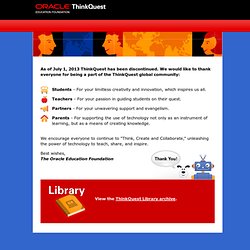
Debate Tips & Strategies - FREE Presentations in PowerPoint format, Free Interactives and Games
First speaker: Keynes has an under-consumption theory of unemployment (to relate the classic Marxist under-consumption vs overproduction debate on crises). Second speaker:American Marxists have in their majority plumped for good ol' Keynesian pump-priming as a solution to the unemployment problem. But leaving aside the technical arguments against that policy in a contemporary US setting, what they forget is.... First Speaker:When I say Keynes has an under-consumption theory of unemployment, I don't mean that American Marxists adopt Keynesianism. Only that Keynes's theory has limited value under capitalism based on it partial overlap with Marxism, and is thereby the basis for reform measures. Reform measures not revolutionary change. Second Speaker:But American Marxists don't really understand the problem in that case. First Speaker:I think we know quite well that there isn't enough popular movement for reform in the US, comrade.
Imaginary debate over Keynes and Marx » pa
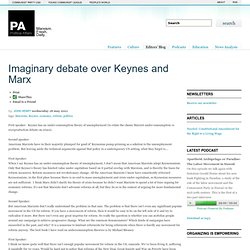
Teaching Debate
DEBATE AND ISSUE 101
The Internet TESL Journal Daniel Kriegershinyfruit [at] yahoo.comSiebold University of Nagasaki (Nagasaki, Japan) Introduction Debate is an excellent activity for language learning because it engages students in a variety of cognitive and linguistic ways. The purpose of this paper is to elaborate upon this point by providing a step-by-step guide that will give teachers everything they need to know for conducting debate in an English class. So, why debate? In addition to providing meaningful listening, speaking and writing practice, debate is also highly effective for developing argumentation skills for persuasive speech and writing. Six-Class Unit Plan The following six-class unit can be adapted to suit a variety of teaching contexts. Class One: Introduction to Debate 1. 2. A resolution is an opinion about which there can be valid disagreement. 3. Part 1: With Your Partner, Think of at Least One Strong Reason for Each Resolution 1. 2. 3. 4. 4. Comparison: X is _____ er than Y. 5. 1. 2. 3.
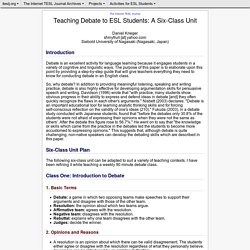
Krieger - Teaching Debate to ESL Students: A Six-Class Unit
Skill Behavior Lookout Example Template PDF
Stage a Debate: A Primer for Teachers (Lincoln-Douglas Debate Format)
 [facebookbadge] Brief Description Try the standard debate format. Includes adaptations of the format plus ten more strategies for engaging students! Objectives Students will understand the debate process. Keywords debate, four corner, role play, Lincoln, constructive, constructor, affirmative, negative, fishbowl, cross-examine, summary, summarize, think-pair-share, inner circle, graphic organizer Materials Needed copy of rules of debate (provided) debate rubric for grading their own and/or peers' debate performances (provided) Lesson Plan This lesson presents several basic debate formats, including the popular Lincoln-Douglas format. In 1859, Senator Stephen A. The basic format of the Lincoln-Douglas debates has long been used as a debate format in competition and in classrooms. Generally speaking, in a Lincoln-Douglas competitive debate, debaters do not know the statement of purpose/policy in advance. More Debate Resources Assessment Lesson Plan Source Education World Submitted By Gary Hopkins
[facebookbadge] Brief Description Try the standard debate format. Includes adaptations of the format plus ten more strategies for engaging students! Objectives Students will understand the debate process. Keywords debate, four corner, role play, Lincoln, constructive, constructor, affirmative, negative, fishbowl, cross-examine, summary, summarize, think-pair-share, inner circle, graphic organizer Materials Needed copy of rules of debate (provided) debate rubric for grading their own and/or peers' debate performances (provided) Lesson Plan This lesson presents several basic debate formats, including the popular Lincoln-Douglas format. In 1859, Senator Stephen A. The basic format of the Lincoln-Douglas debates has long been used as a debate format in competition and in classrooms. Generally speaking, in a Lincoln-Douglas competitive debate, debaters do not know the statement of purpose/policy in advance. More Debate Resources Assessment Lesson Plan Source Education World Submitted By Gary Hopkins
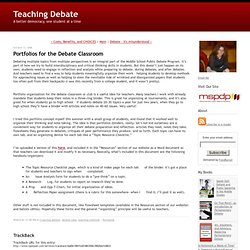
Teaching Debate: Portfolios for the Debate Classroom
Debating multiple topics from multiple perspectives is an integral part of the Middle School Public Debate Program. It’s part of how we try to build interdisciplinary and critical thinking skills in students. But this doesn’t just happen on its own; students need to engage in reflection and analysis while preparing to debate, during debates, and after debates. And teachers need to find a way to help students meaningfully organize their work – helping students to develop methods for approaching issues as well as helping to stem the inevitable tide of wrinkled and disorganized papers that students too often pull from their backpacks (I saw this recently from a college student, and it wasn’t pretty). Portfolio organization for the debate classroom or club is a useful idea for teachers. Many teachers I work with already mandate that students keep their notes in a three-ring binder. The Topic Resource Checklist page, which is a kind of index page for each tab of the binder.
Many teachers believe that debating is something you do once, or a few times, and then it's done. Or, alternately, they never have debates in class at all - thinking that there's no time (thank you, pacing guide!), or that they don't have the necessary expertise. I'd like to suggest that there's nothing intrinsically valuable about debate. What's good about writing a research paper is the way that the project exercises a complementary set of component skills, such as researching, summarizing, outlining, constructing a thesis statement, making subjects and verbs agree, and so forth -- it's a convenient (if difficult) way to have students work on all of those different skills at the same time - the mental equivalent of cross training. Debate works in the same way. Done poorly, debate provides a mixed bag- people yelling at each other, students reading from scripts that they didn't write, and so forth. I think there are three essential, basic debate skills: 1. 1. 2. So easy! 3.
Teaching Debate: teaching methods
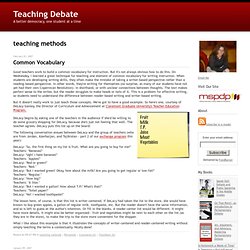
Teaching tips: How to hold a class debate - by Shilo Dawn Goodson
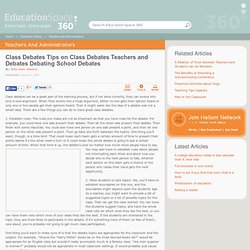 Shilo Dawn Goodson's image for: "Class Debates Tips on Class Debates Teachers and Debates Debating School Debates" Caption: Location: Image by: Class debates can be a great part of the learning process, but if not done correctly, they can evolve into only a loud argument. 1. 2. One thing you'll want to make sure of is that the debate topics are appropriate for the classroom and the subject. This is probably common sense, but one thing you'll want to be careful about would be allowing topics that might purposely single out one person. 3 Make sure sides are even- When one side has 10 people and the other side has two people, it's really not a fair or a fun debate. One solution to the uneven sides issue is to assign people which side they are going to argue. One thing to note is that it doesn't have to be completely even with two against two or four against four. 4. 5.
Shilo Dawn Goodson's image for: "Class Debates Tips on Class Debates Teachers and Debates Debating School Debates" Caption: Location: Image by: Class debates can be a great part of the learning process, but if not done correctly, they can evolve into only a loud argument. 1. 2. One thing you'll want to make sure of is that the debate topics are appropriate for the classroom and the subject. This is probably common sense, but one thing you'll want to be careful about would be allowing topics that might purposely single out one person. 3 Make sure sides are even- When one side has 10 people and the other side has two people, it's really not a fair or a fun debate. One solution to the uneven sides issue is to assign people which side they are going to argue. One thing to note is that it doesn't have to be completely even with two against two or four against four. 4. 5.
L'emploi en débats »
L'emploi en débats »
Pierre Rosanvallon est professeur au Collège de France. Il a publié de nombreux ouvrages sur l’histoire de la démocratie et ses métamorphoses contemporaines, dont, notamment, La société des égaux (Points-Seuil, 2013). Avec son projet «Raconter la vie», il donne la parole aux «invisibles» et veut contribuer à sortir de cet état inquiétant qui mine la démocratie et décourage les individus. Voir les vies ordinaires racontées, les voix de faible ampleur écoutées, la réalité quotidienne prise en compte, voici l’ambition de «Raconter la vie» et de son «Parlement des invisibles», un espace d’expérimentation sociale et politique, autant qu’intellectuelle et littéraire. publicité Pierre Rosanvallon sera l’invité de la Cité des Livres et de la Fondation Jean-Jaurès, dont Slate est partenaire. Informations et réservations ici. Devenez fan sur , suivez-nous sur
débat

Em entrevista ao vivo logo após o debate do SBT nesta quinta-feira, a presidente-candidata Dilma Rousseff (PT) perdeu o rumo ao falar sobre o duríssimo embate com Aécio Neves, candidato do PSDB à Presidência. Ao responder a pergunta da repórter Simone Queiroz, Dilma gaguejou ao tentar dizer a palavra "inequívoco", se enrolou e pediu para recomeçar a entrevista, momento em que foi avisada que estava ao vivo. Ela tentou retomar o discurso, mas em seguida alegou ter sentido uma queda de pressão e foi conduzida até uma cadeira próxima. "A presidente está passando mal aqui", disse a repórter, assustada. Leia também: Corrupção e ataques pessoais marcam debate agressivo entre Dilma e Aécio Um comentarista do SBT entrou no ar. A repórter disse que esperava que a presidente estivesse se sentindo bem. Nos bastidores, os assessores da presidente se apressaram em afirmar que Dilma não havia comido nada o dia todo e se sentiu mal ao levantar da cadeira para a entrevista. TAGs: Maquiavel Dilma Rousseff
Desorientada, Dilma interrompe entrevista após debate - Brasil - Notícia - VEJA.com
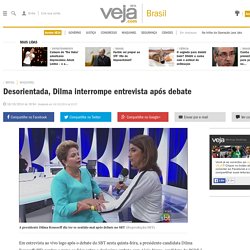
Peluso diz que enviará até abril proposta de Lei Orgânica da Magistratura ao Congresso, onde já há projetos com redução de benefícios Felipe Recondo, de O Estado de S.Paulo BRASÍLIA - Os juízes perderão a blindagem que protege seus benefícios e certas regalias, criados em 1979 com a edição da Lei Orgânica da Magistratura (Loman). O presidente do Supremo Tribunal Federal (STF), ministro Cezar Peluso, informou ao Estado que mandará para o Congresso até o final de sua gestão, em abril, a proposta de uma nova lei. O texto ainda não está fechado e pode não sugerir grandes mudanças nas regras, mas abre caminho para que o Congresso acabe com alguns privilégios considerados anacrônicos até por parte da magistratura. A lei que regula essa área da vida pública permanece intocada há mais de 30 anos. De maneira geral, todas as iniciativas de mudança foram combatidas pelas entidades de classe da magistratura. Férias duplas. As associações de classe são contra a alteração.
Nova lei põe regalia de juízes em debate :: Notícias JusBrasil
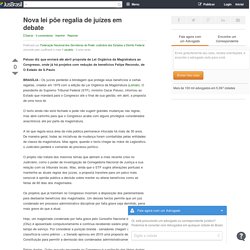
A senadora Ana Amélia (PP-RS) solicitará que a Comissão de Educação do Senado (CE) promova no início do ano que vem uma audiência pública sobre o novo acordo ortográfico. Enquanto o Brasil deve concluir a implementação do acordo em 2013, outros países de língua portuguesa enfrentam resistências - inclusive Portugal. Uma das providências que podem ser estudadas pelo Senado é a criação de um grupo de trabalho sobre o assunto. Ana Amélia anunciou a audiência logo após se reunir, nesta segunda-feira (28), com o professor Ernani Pimentel. Autor de diversas críticas ao novo acordo ortográfico, o professor criou o Movimento Acordar Melhor para divulgar suas ideias. Simplificação Pimentel defende a simplificação das regras, porque, segundo ele, o novo acordo contém "incoerências, incongruências e muitas exceções". - Por que 'mandachuva' se escreve sem hífen e 'guarda-chuva' se escreve com hífen? Mercado e soberania - Ao forçar o acordo, o Brasil está sendo visto como impositor. Ações judiciais
Senado deve voltar a debater acordo ortográfico
Estadisticas del recurso: 9 comentarios Relieve grupal – Abstracción Proyecto de Escultura desarrollado en un primer año de la Escuela de Artes Nro. 500 de la ciudad de Gral. Madariaga A partir de una práctica docente realizada en la Escuela de Arte Nro. 500 de la ciudad de Gral. 25 comentarios Proyecto NUESTRO CUENTO Proyecto realizado con alumnos de niveles 3, 4 y 5. “Los seres humanos somos capaces de conocer el mundo de siete modos diferentes: a través del lenguaje, del lenguaje lógico matemático, de la representación espacial, del pensamiento musical, del uso del cuerpo, para resolver problemas o hacer cosas, de una comprensión de los demás individuos y de la comprensión de nosotros mismos”. El niño pequeño es un aprendiz intuitivo, natural, que dotado para aprender los sistemas simbólicos, desarrolla teorías prácticas acerca del mundo físico y del mundo de las demás personas durante los primeros años de su vida. 48 comentarios Proyecto “arte para vincularte" 23 comentarios 17 comentarios
Debate
Debate
Debate
Tras el éxito de la III edición de la Liga de Debate Escolar celebrada durante el curso escolar 2014/15 en la que participaron alumnos y alumnas de 4º de la ESO de 96 centros, 16 por cien más que la edición anterior, de las provincias de Alicante, Castellón, Murcia, Palma de Mallorca y Valencia. La Fundación Educativa Activa-t se ha marcado como objetivo, para la IV edición de la Liga de Debate Escolar que se celebrará durante el curso 2015/16, consolidar el proyecto en las provincias en las que está presente, aumentando el número de colegios participantes y ampliándolo a las provincias de Castilla la Mancha y Aragón. Participa en la edición 2015/16 La Liga de Debate Escolar tiene como objetivo principal contribuir al desarrollo de l@s jóvenes en un entorno divertido e informal, donde se potencia la sana competitividad, sin perder el rigor académico, cultivando activamente habilidades y capacidades personales y sociales. Objetivos Liga Debate Escolar Formulario Inscripción Papel del docente
LIGA DEBATE 4º ESO | Debate Escolar
La Lliga de Debat Universitària és una competició en la qual, durant una setmana, diferents equips d’estudiants universitaris debaten sobre un tema polèmic i d’actualitat. Els equips representen la seua universitat i han d’estar formats per un màxim de 5 persones –dos oradors, dos documentalistes, i un reserva– a més d’un capità. Com es desenvolupa la Lliga? Mesos abans del començament de la Lliga es fa públic el tema del debat. Durant la competició, els equips no coneixen quina posició han de defensar (a favor o en contra) fins a uns minuts abans de començar cada enfrontament. Un equip de jutges decideix quina argumentació s’ha realitzat amb el màxim rigor i de la forma més convincent posible, d’acord amb els criteris establerts a les bases de la competició. Propera edició de la Lliga Lliga de Debat Universitària 2016 Lligues anteriors XI Lliga de Debat Universitària (Universitat Oberta de Catalunya, del 23 al 27 de març de 2015) Més informació… … i encara més:
Lliga de Debat Universitària | Xarxa Vives
Una delle metodologie didattiche attive che merita un sempre maggiore interesse da parte soprattutto dei docenti della scuola secondaria, sia di primo che secondo grado, è il debate o “dibattito critico”. Si tratta di una tecnica mediante la quale due studenti, o due gruppi di studenti, si confrontano dialetticamente su un problema dato, all’interno di una cornice di regole, strumenti e tempi decisa a monte col docente. Tale tecnica, molto adoperata nelle scuole anglosassoni (in alcuni casi è persino curricolare), affonda le sue radici nelle “controversiae et suasoriae” del mondo latino o, per avvicinarci maggiormente al nostro tempo, nelle “disputationes” medievali. Come strutturare quindi una azione didattica tramite il debate? – Argomento: il docente, possibilmente con gli alunni, sceglie un tema da dibattere; si consiglia la scelta di argomenti vicini al vissuto degli alunni, ad esempio l’uso della rete e dei social network, l’uso (e l’abuso) del cibo spazzatura. oppure
Metodologie Attive: il Debate. Di che si tratta | Design Didattico
Teaching Kids to Argue—Respectfully
Debate: quando Cicerone parla inglese | Lezioni di Spettacolo
About EDEB8: Team debates, video debates, debate coaching...
Réussir un débat
DebatMouvant
Exploitation pédagogique de Wikidébats
Le genre du débat sur une question socialement vive
What To Set Up – a Program for Debate – Debating Matters
ESL Debates - Debating resources for teachers




 Krieger - Teaching Debate to ESL Students: A Six-Class Unit
Krieger - Teaching Debate to ESL Students: A Six-Class Unit
 [facebookbadge] Brief Description Try the standard debate format. Includes adaptations of the format plus ten more strategies for engaging students! Objectives Students will understand the debate process. Keywords debate, four corner, role play, Lincoln, constructive, constructor, affirmative, negative, fishbowl, cross-examine, summary, summarize, think-pair-share, inner circle, graphic organizer Materials Needed copy of rules of debate (provided) debate rubric for grading their own and/or peers' debate performances (provided) Lesson Plan This lesson presents several basic debate formats, including the popular Lincoln-Douglas format. In 1859, Senator Stephen A. The basic format of the Lincoln-Douglas debates has long been used as a debate format in competition and in classrooms. Generally speaking, in a Lincoln-Douglas competitive debate, debaters do not know the statement of purpose/policy in advance. More Debate Resources Assessment Lesson Plan Source Education World Submitted By Gary Hopkins
[facebookbadge] Brief Description Try the standard debate format. Includes adaptations of the format plus ten more strategies for engaging students! Objectives Students will understand the debate process. Keywords debate, four corner, role play, Lincoln, constructive, constructor, affirmative, negative, fishbowl, cross-examine, summary, summarize, think-pair-share, inner circle, graphic organizer Materials Needed copy of rules of debate (provided) debate rubric for grading their own and/or peers' debate performances (provided) Lesson Plan This lesson presents several basic debate formats, including the popular Lincoln-Douglas format. In 1859, Senator Stephen A. The basic format of the Lincoln-Douglas debates has long been used as a debate format in competition and in classrooms. Generally speaking, in a Lincoln-Douglas competitive debate, debaters do not know the statement of purpose/policy in advance. More Debate Resources Assessment Lesson Plan Source Education World Submitted By Gary Hopkins
 Teaching Debate: Portfolios for the Debate Classroom
Debating multiple topics from multiple perspectives is an integral part of the Middle School Public Debate Program. It’s part of how we try to build interdisciplinary and critical thinking skills in students. But this doesn’t just happen on its own; students need to engage in reflection and analysis while preparing to debate, during debates, and after debates. And teachers need to find a way to help students meaningfully organize their work – helping students to develop methods for approaching issues as well as helping to stem the inevitable tide of wrinkled and disorganized papers that students too often pull from their backpacks (I saw this recently from a college student, and it wasn’t pretty). Portfolio organization for the debate classroom or club is a useful idea for teachers. Many teachers I work with already mandate that students keep their notes in a three-ring binder. The Topic Resource Checklist page, which is a kind of index page for each tab of the binder.
Teaching Debate: Portfolios for the Debate Classroom
Debating multiple topics from multiple perspectives is an integral part of the Middle School Public Debate Program. It’s part of how we try to build interdisciplinary and critical thinking skills in students. But this doesn’t just happen on its own; students need to engage in reflection and analysis while preparing to debate, during debates, and after debates. And teachers need to find a way to help students meaningfully organize their work – helping students to develop methods for approaching issues as well as helping to stem the inevitable tide of wrinkled and disorganized papers that students too often pull from their backpacks (I saw this recently from a college student, and it wasn’t pretty). Portfolio organization for the debate classroom or club is a useful idea for teachers. Many teachers I work with already mandate that students keep their notes in a three-ring binder. The Topic Resource Checklist page, which is a kind of index page for each tab of the binder.

 Shilo Dawn Goodson's image for: "Class Debates Tips on Class Debates Teachers and Debates Debating School Debates" Caption: Location: Image by: Class debates can be a great part of the learning process, but if not done correctly, they can evolve into only a loud argument. 1. 2. One thing you'll want to make sure of is that the debate topics are appropriate for the classroom and the subject. This is probably common sense, but one thing you'll want to be careful about would be allowing topics that might purposely single out one person. 3 Make sure sides are even- When one side has 10 people and the other side has two people, it's really not a fair or a fun debate. One solution to the uneven sides issue is to assign people which side they are going to argue. One thing to note is that it doesn't have to be completely even with two against two or four against four. 4. 5.
Shilo Dawn Goodson's image for: "Class Debates Tips on Class Debates Teachers and Debates Debating School Debates" Caption: Location: Image by: Class debates can be a great part of the learning process, but if not done correctly, they can evolve into only a loud argument. 1. 2. One thing you'll want to make sure of is that the debate topics are appropriate for the classroom and the subject. This is probably common sense, but one thing you'll want to be careful about would be allowing topics that might purposely single out one person. 3 Make sure sides are even- When one side has 10 people and the other side has two people, it's really not a fair or a fun debate. One solution to the uneven sides issue is to assign people which side they are going to argue. One thing to note is that it doesn't have to be completely even with two against two or four against four. 4. 5.


